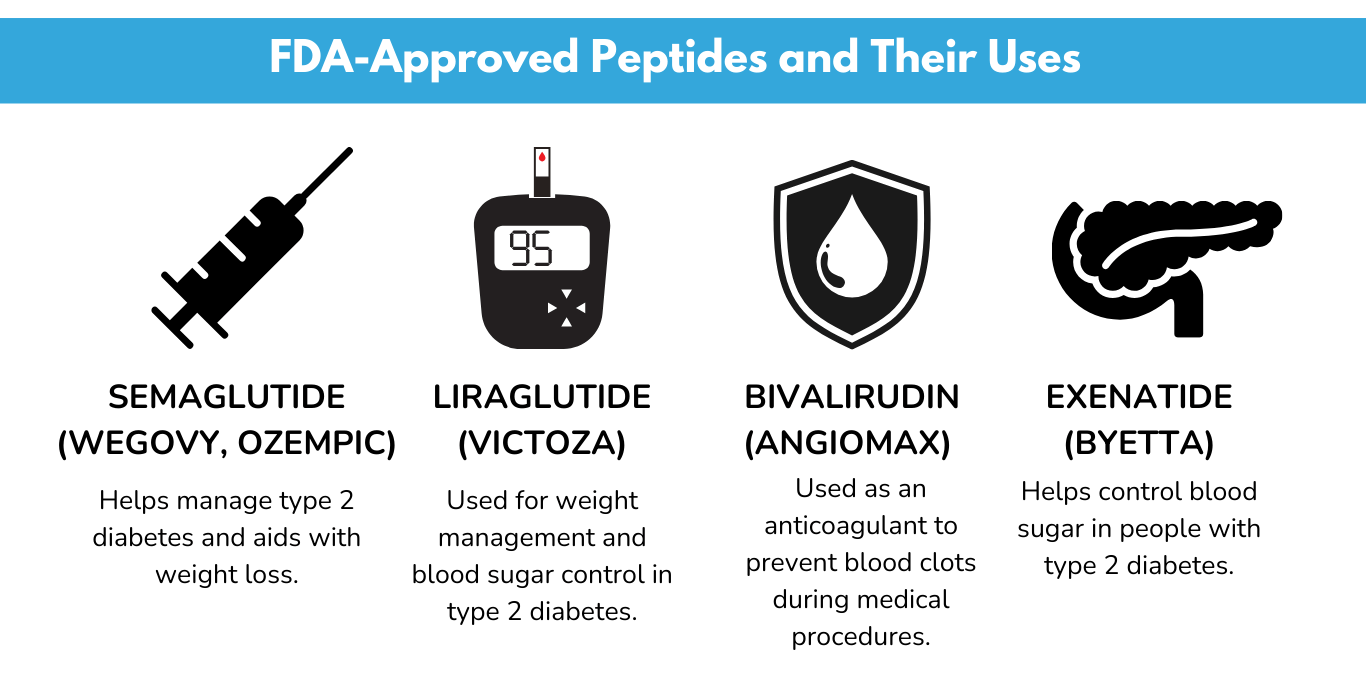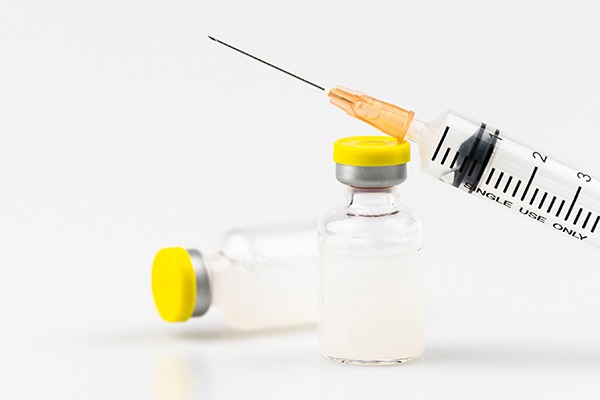Peptides are legal in the USA under certain conditions. They can be sold for research purposes but not for human consumption.
Understanding peptide legality is crucial for buyers and sellers alike. Peptides are small proteins with many uses, from scientific studies to potential treatments. Their growing popularity raises questions about their legal status. Some people want to know if they can buy or use peptides without breaking the law.
This blog will explore the rules and regulations around peptides in the USA. We will discuss why these rules exist and what they mean for consumers and researchers. By understanding these legal details, you can make informed choices about purchasing or using peptides. Stay with us to learn more about peptide legality in the USA.

Credit: www.bcnpeptides.com
Introduction To Peptides
Peptides have gained popularity in recent years. These tiny molecules have found their way into health, beauty, and fitness sectors. Their popularity stems from potential benefits they offer. This leads to curiosity about their legality and uses.
What Are Peptides?
Peptides are short chains of amino acids. They are smaller than proteins. Naturally occurring in the body, they play vital roles. Functions include acting as hormones, signaling molecules, and building blocks. Scientists can also create synthetic peptides. These are used in research and medicine.
Uses Of Peptides
Peptides serve various purposes in different fields. In medicine, they help treat conditions and improve immune response. In skincare, peptides promote collagen production. This helps reduce wrinkles and improve skin texture. Athletes use peptides to enhance muscle growth and recovery. Their versatility is impressive.

Credit: amazing-meds.com
Legal Status Of Peptides
The legality of peptides in the USA is a topic that often sparks curiosity and confusion. Whether you’re a fitness enthusiast, a skincare aficionado, or someone who stumbled upon peptides in a casual chat, knowing their legal status is crucial. Are peptides legal in the USA? Let’s break it down for clarity.
Federal Regulations
At the federal level, peptides occupy a unique position. The Food and Drug Administration (FDA) regulates them, but their approval depends on intended use. Peptides used for medical purposes must undergo rigorous FDA scrutiny.
However, peptides marketed for research purposes fall into a gray area. They can be sold legally but are not intended for human consumption. This distinction is vital if you’re considering peptides for personal use.
State-by-state Variations
While federal regulations provide a broad framework, state laws can vary significantly. Some states have stricter regulations, limiting the sale and use of peptides. This means you need to be aware of local laws.
For instance, California has specific guidelines about the distribution of research chemicals, including peptides. If you’re based in a different state, it’s worth checking local regulations to avoid any legal pitfalls.
Have you ever thought about how these state variations can impact your access to peptides? Navigating these differences is essential to ensure you’re on the right side of the law.
Understanding the legal landscape of peptides in the USA requires attention to both federal and state regulations. Whether you’re a potential buyer or just curious, being informed helps you make better decisions. What are your thoughts on how the legality affects access and innovation in the peptide industry?
Peptides In Research
Peptides are legal in the USA for research purposes. They cannot be marketed for human consumption. Understanding the regulations is crucial for researchers.
Peptides are small chains of amino acids, and they have gained significant attention in scientific research due to their potential benefits in various fields. Their role in research is vast, from understanding cellular processes to developing new treatments for diseases. But are peptides legal in the USA? This is a question many researchers and enthusiasts ponder, given their potential and the regulations surrounding them.Role In Scientific Studies
Peptides play a crucial role in scientific studies. Researchers use them to explore complex biological processes and understand how the body functions. For example, insulin is a peptide that regulates blood sugar, and its discovery has been vital in diabetes research. Scientists often use peptides to study protein interactions, which can lead to breakthroughs in treatments for diseases like cancer and Alzheimer’s. You might wonder how these tiny molecules can have such an impact. The answer lies in their ability to mimic natural processes, providing insights that are otherwise difficult to obtain. Have you ever thought about how new drugs are developed? Peptides are frequently used in drug discovery to test new treatments and therapies. They offer a foundation for creating drugs that can precisely target specific areas in the body.Approved Research Applications
In the USA, peptides are mainly used for research purposes. The FDA has approved certain peptides for research applications, but using them outside these parameters can be illegal. This means researchers can legally study peptides to find new medical treatments or understand diseases better. Some peptides have gained approval for specific research uses, such as those involved in hormone regulation or immune system studies. These approvals ensure that research is conducted safely and ethically, benefiting both scientists and the public. Are you curious about the ethical considerations in research? Researchers must follow strict guidelines to ensure their work is ethical and beneficial. This is crucial when using peptides, as improper use can lead to misinformation or harm. Understanding the legal landscape of peptides in research is important for scientists and consumers alike. It helps ensure that discoveries are made responsibly and that new treatments are safe and effective for everyone.Peptides In Medicine
Peptides play a vital role in modern medicine. They are short chains of amino acids. These chains help in various bodily functions. In medicine, peptides serve multiple purposes. They aid in diagnosing and treating diseases.
Their potential in medicine is vast. From cancer treatment to wound healing, they are essential. Researchers continually explore new applications. Understanding their legal status is crucial for patients and professionals.
Fda Approvals
The FDA regulates peptide use in medicine. Only approved peptides are legally used. Approval ensures safety and effectiveness. Many peptides have gained FDA approval. These approvals allow their use in treatments.
Some peptides are still under review. The approval process is thorough. It ensures public safety and trust. Patients benefit from approved treatments. It’s important to check the FDA’s list of approved peptides.
Clinical Trials
Clinical trials test peptide safety and efficacy. Researchers conduct these trials to gain insights. They help determine potential medical uses. Trials are essential for FDA approvals. They provide valuable data for decision-making.
Participants contribute to medical advancements. Trials follow strict ethical guidelines. They ensure participant safety and well-being. Successful trials lead to new treatments. They expand the possibilities for peptide use in medicine.
Peptides In Sports And Fitness
Peptides have gained attention in sports and fitness circles. Athletes and fitness enthusiasts explore peptides for potential benefits. These tiny proteins might offer advantages in muscle growth and recovery. Understanding their role in sports can be crucial for performance improvement.
Usage Among Athletes
Athletes often use peptides for their muscle-building properties. Peptides may support faster recovery after intense workouts. Some athletes believe peptides help in reducing fatigue. This can lead to more effective training sessions. Improved endurance is another reason athletes turn to peptides.
Impact On Performance
Peptides could enhance athletic performance. They might boost strength and stamina. Some studies suggest peptides aid in muscle repair. Faster recovery means less downtime between workouts. This can result in noticeable progress in fitness goals. Athletes using peptides might experience increased energy levels.
Risks Of Peptide Use
Peptides, often used for muscle growth, carry legal and health risks in the USA. They are sometimes unregulated, posing dangers like allergic reactions or contamination. Understanding the legal status and potential side effects is crucial for safe use.
Peptides are popular for muscle growth and anti-aging. Yet, their use carries risks. Many users overlook potential health issues. Legal troubles can arise too. Understanding these risks is crucial.Health Concerns
Using peptides without guidance can harm your body. Some users experience allergic reactions. Others report skin problems like rashes. Peptides may affect heart health. Blood pressure can increase. Hormonal imbalance is another risk. This can lead to mood swings. Always consult a healthcare professional.Legal Consequences
Purchasing peptides can lead to legal issues. Many peptides are unregulated. Selling them without approval is illegal. Importing peptides may violate laws. Customs can confiscate shipments. Selling peptides without a prescription is risky. Legal penalties vary by state. Know the laws in your area. “`Purchasing Peptides
Purchasing peptides in the USA requires a cautious approach. While peptides can offer significant benefits, their legal status can be tricky. Knowing where and how to purchase them can make a big difference in your experience.
Reputable Sources
When buying peptides, it’s crucial to choose reputable sources. Look for suppliers with positive reviews and clear business practices. Verify that they comply with all regulations and standards.
Reputable suppliers often provide certificates of analysis. These certificates ensure the quality and purity of peptides. Don’t hesitate to ask suppliers for these documents.
Remember, a higher price may reflect better quality. However, this isn’t always the case, so do your research. What experiences have you had when choosing between price and quality?
Online Marketplaces
Online marketplaces can offer convenience. Yet, they also come with risks. Many sites sell peptides, but not all ensure quality or legality.
On platforms like eBay or Amazon, anyone can be a seller. This increases the risk of counterfeit or low-quality products. Always check seller ratings and reviews before making a purchase.
Consider using specialized peptide websites. They often have better security and quality control measures. Have you ever bought something online only to find out it wasn’t what you expected?
Make informed choices when purchasing peptides. It’s not just about finding the best price. It’s about ensuring safety and efficacy for your needs.
Future Of Peptide Regulation
The future of peptide regulation in the USA holds much intrigue. As peptides gain popularity, their legal status becomes a hot topic. These compounds, used in various fields, face potential changes in their regulation. Understanding the evolving landscape of peptide regulation is crucial for researchers, businesses, and enthusiasts.
Potential Changes
Regulations might shift as peptides are further researched. Authorities could tighten rules to ensure safety and efficacy. New laws may require better documentation and testing. This could affect how peptides are sold and used. Businesses might need to adapt to these new guidelines.
Influence Of New Research
New studies on peptides can shape future regulations. Research might reveal more benefits or risks. Authorities might use this data to update laws. Positive findings could lead to wider acceptance. Concerns might lead to stricter controls.
Research outcomes can influence how peptides are viewed. They might change public perception. This can impact demand and regulation. Keeping up with research developments is key for stakeholders.

Credit: www.usada.org
Frequently Asked Questions
Are Peptides Legal In The Usa?
Peptides are legal in the USA for research purposes. They must be purchased from reputable suppliers. Some peptides are restricted for human consumption. Always check FDA guidelines and state regulations before purchasing.
Do I Need A Prescription For Peptides?
You often need a prescription for peptides, as they are regulated substances. Consult a healthcare professional for guidance. Some peptides might be available over-the-counter, but it’s crucial to ensure their legality and safety. Always prioritize professional advice for proper usage and avoid purchasing from unverified sources.
Can I Buy Peptides Over The Counter?
Peptides are typically not available over the counter. They often require a prescription from a healthcare provider. Availability depends on regulations in your country. Always consult with a professional before purchasing peptides to ensure safety and legality.
Are There Any Fda Approved Peptides?
Yes, the FDA has approved certain peptides for medical use. Examples include insulin for diabetes and leuprolide for prostate cancer. Peptides are also used in some cosmetic and therapeutic applications. Always consult a healthcare professional for safe and approved peptide treatments.
Conclusion
Peptides in the USA fall under strict regulations. Knowing these rules is crucial. Some peptides are legal, while others need prescriptions. It’s vital to check state and federal laws. Research peptides are generally legal but not for human use. Consult a professional before buying or using peptides.
This ensures safety and compliance. Being informed helps avoid legal issues. Stay updated with the latest information. Laws can change, impacting availability and use. Always prioritize health and legality. Understanding the legal landscape keeps you safe and informed.



Add comment